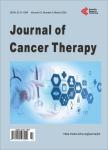Angiotensin-(1-7)Changes Apoptosis-Related Genes Expression in Human Breast Cancer Cell Line T47D
血管紧张素 - (1-7)变更凋亡相关基因在人类乳腺癌细胞系T47D表达作者机构:Department of GynecologyFederal University of Sao PauloSao PauloBrazil Department of SurgeryFederal University of Sao PauloSao PauloBrazil Department of BiophysicsFederal University of Sao PauloSao PauloBrazil
出 版 物:《Journal of Cancer Therapy》 (癌症治疗(英文))
年 卷 期:2014年第5卷第14期
页 面:1412-1422页
学科分类:1002[医学-临床医学] 100214[医学-肿瘤学] 10[医学]
基 金:supported by grants number 2008/54383-0 2010/03658-9 and 2011/08531-0 from the Sao Paulo Research Foundation(FAPESP)-Brazil
主 题:Angiotensin-(1-7) Breast Cancer Cells Apoptosis qPCR Array
摘 要:Angiotensin-(1-7) [Ang-(1-7)] is a heptapeptide of the renin-angiotensin system with vasodilator and anti-proliferative properties. In the present study, we aim to investigate whether Ang-(1-7) induces apoptosis in breast cancer cells and whether the altered expression of apoptosis-related genes is involved in this process. Human breast cell line T47D was treated with angiotensin-(1-7) and angiotensin II (Ang II). Cell proliferation and apoptosis were quantified using hemocytometer and flow cytometry, respectively. The expression of 84 apoptosis-related genes was evaluated through qPCR array. Ang-(1-7), as opposed to Ang II, decreased proliferation and increased apoptosis in T47D cells. Moreover, many pro-apoptotic genes were up-regulated, such as BAK1, BAX, BCL2L1, BID and BIK. In addition, some anti-apoptotic genes as AKT1 and XIAP were down-regulated by heptapeptide. Although a deeper study should be performed, our results support the hypothesis that Ang-(1-7) could change the expression of several genes related to apoptosis, interfering directly in the molecular pathways associated with the survival of breast cancer cells.



